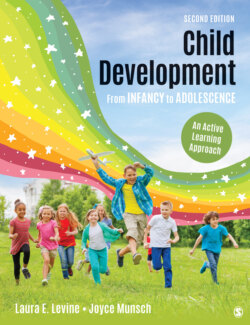Читать книгу Child Development From Infancy to Adolescence - Laura E. Levine - Страница 224
На сайте Литреса книга снята с продажи.
Miscarriage
ОглавлениеIt is not uncommon for a pregnancy to result in miscarriage, which is the natural loss of a pregnancy before 20 weeks gestational age of the fetus (U.S. National Library of Medicine, 2016c). Genetic abnormalities are the most common cause of miscarriage, but in many cases the cause is unknown. However, when medical professionals can identify a cause, it is easier for women to come to terms with the loss, and knowing the cause relieves some of the initial distress (Nikcevic & Nicolaides, 2014).
Miscarriage: The natural loss of a pregnancy before the fetus reaches a gestational age of 20 weeks.
Gestational age: The age of the developing fetus, measured from the mother’s last menses.
Women utilize a number of coping strategies to deal with the loss of a pregnancy (Van, 2012). Most talk with others about their loss, and talking with another woman who has herself experienced the loss of a pregnancy can be particularly helpful. Not only is there a feeling of shared understanding, but if the other woman has subsequently carried a pregnancy to term, it also provides reassurance and a sense of hope in the situation. Partners or others who feel they don’t know what to say or do should be aware that “just being there” is an important and effective way to help the grieving process (Van, 2012, p. 82). Recurrent miscarriage affects only 1% to 3% of couples (Alijotas-Reig & Garrido-Gimenez, 2013), so most women who have a miscarriage can take comfort from the fact that they will be able to have children through a future pregnancy.
In some cases, a woman may choose to terminate a pregnancy by having an induced abortion, a medical procedure that uses medicine or surgery to remove an embryo or fetus and placenta from a woman’s uterus (U.S. National Library of Medicine, 2016a). Worldwide, about 25% of pregnancies end in abortion and in the United States it is about 19% (Guttmacher Institute, 2016, 2017b). Abortion is a difficult choice for a woman to make, but the American Psychological Association’s Task Force on Mental Health and Abortion concluded that adult women with an unplanned pregnancy who have an abortion during the first trimester have no worse psychological outcome than those who deliver the baby (APA, 2014). A negative reaction after an abortion is more likely if the woman has little support for the procedure, has had previous mental health problems, or if the pregnancy was wanted (APA, 2014).
Abortion: A medical procedure that uses medicine or surgery to remove an embryo or fetus and placenta from a woman’s uterus.
